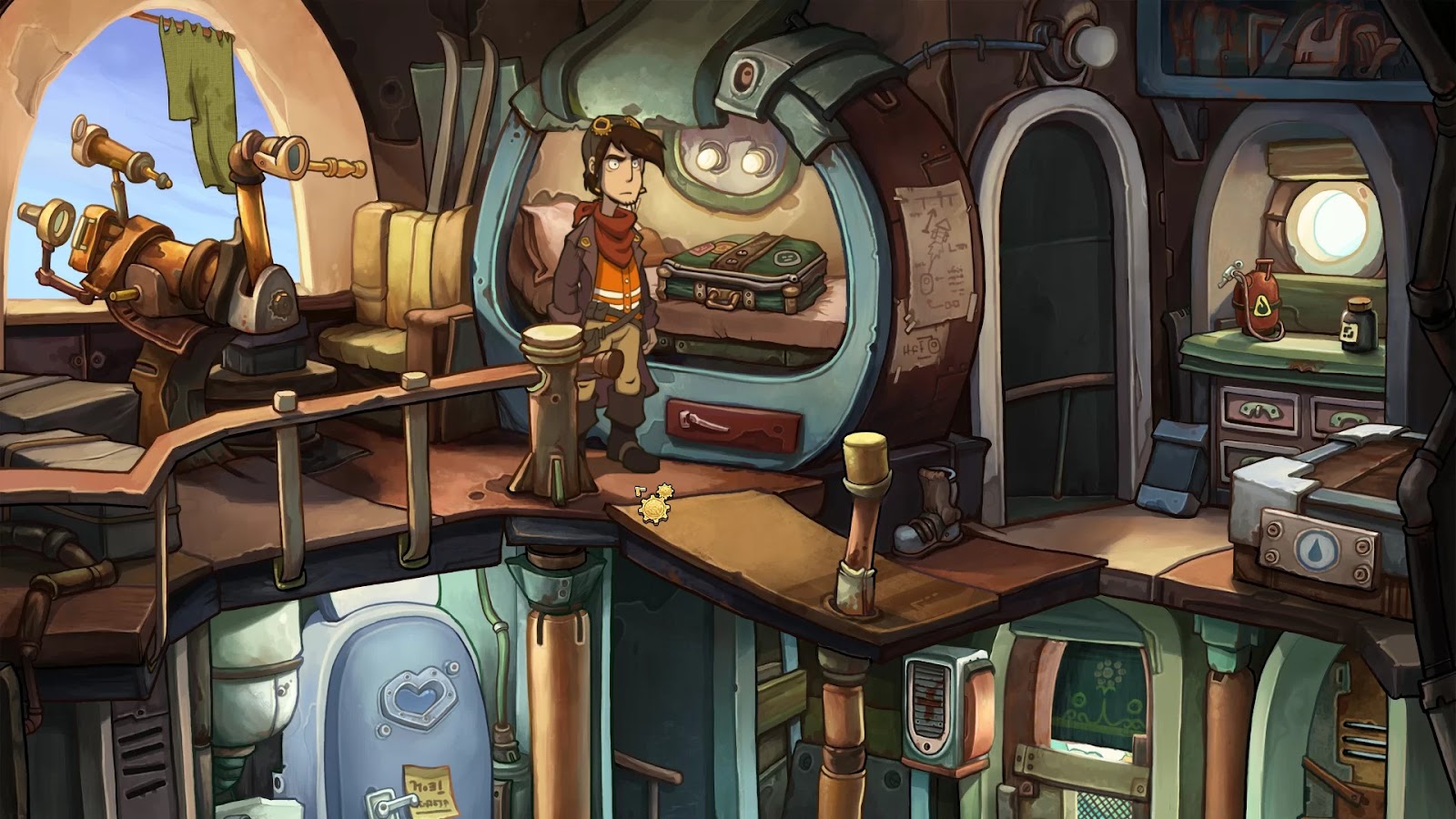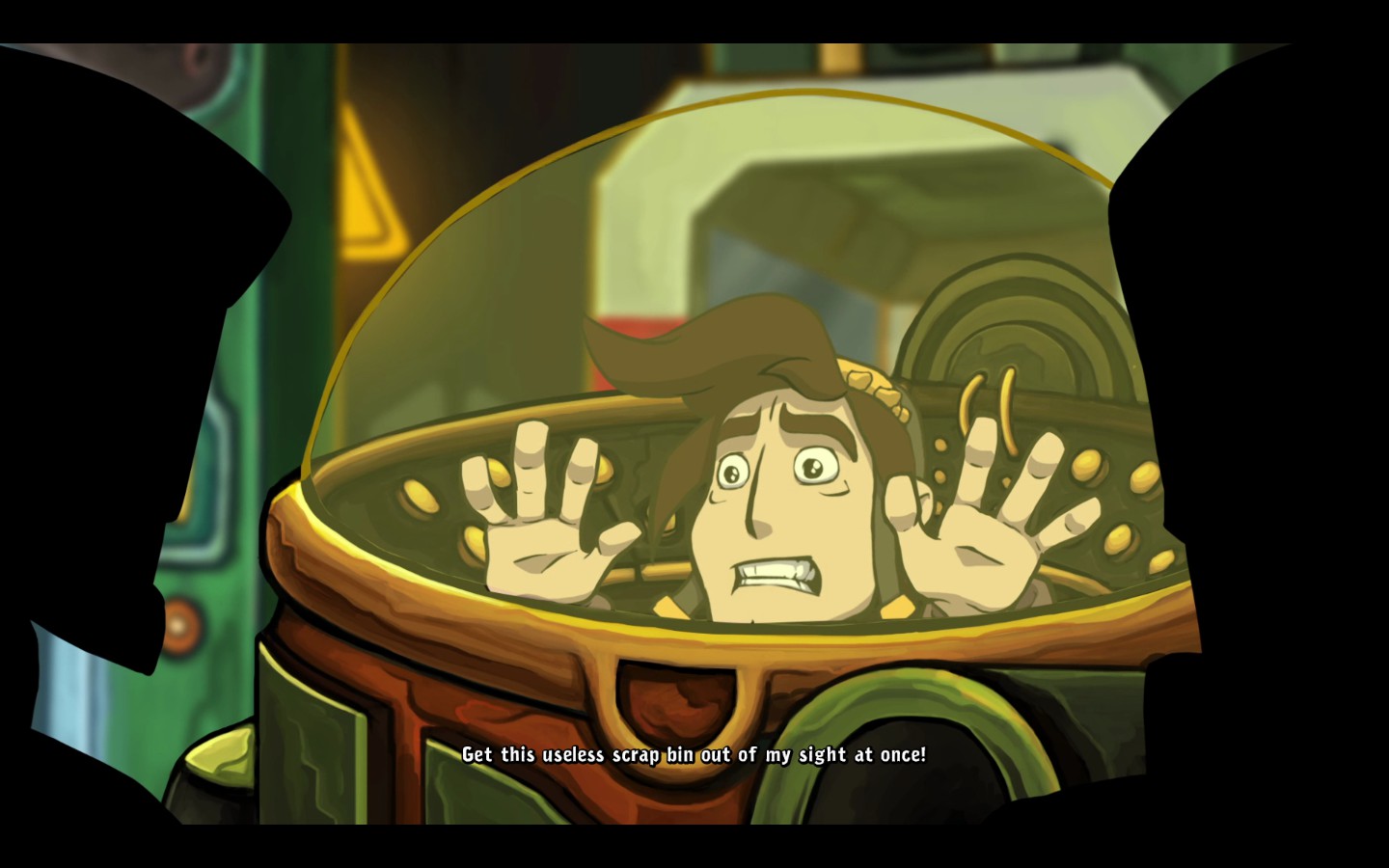Droggeljug. Droggeljug. Droggeljug. Okay- insider jokes aside, I was recently given the privilege to review Deponia Doomsday, the fourth entry in the Deponia series. Developed by Daedalic Entertainment, the ‘trilogy’s’ third entry was released on 2013, so it’s been awhile since I played the games. So, I decided it would awesome to jump back into the series for a little recap on the outlandish and poignant series, and to offer my brief views on the series as a whole.
 Deponia is about a young tinker named Rufus, living in a world that’s been covered in trash. This trash heap of a planet is filled with nature’s purest scavengers such as the pelican, crabs and, of course, platypuses. Humans are no exception, finding useful bits of scrap and salvaging them into makeshift architectures and products. Everyone lives pretty peacefully despite the living conditions of Fallout 4, with everyone keeping their optimistic point of view and happily living in squaller. Rufus wants to leave his boring hometown of Kuvaq, and they want him gone; simply because he removed the town’s air purifier’s filter. That, and he’s a bit of a pyro. And he started a war with a neighboring town before he even turned four. Don’t even let me get started on his parental situation. He’s leaving for Elysium, a mysterious floating city with rumors of riches and tales of abundance that run rampant among the land dwellers.
Deponia is about a young tinker named Rufus, living in a world that’s been covered in trash. This trash heap of a planet is filled with nature’s purest scavengers such as the pelican, crabs and, of course, platypuses. Humans are no exception, finding useful bits of scrap and salvaging them into makeshift architectures and products. Everyone lives pretty peacefully despite the living conditions of Fallout 4, with everyone keeping their optimistic point of view and happily living in squaller. Rufus wants to leave his boring hometown of Kuvaq, and they want him gone; simply because he removed the town’s air purifier’s filter. That, and he’s a bit of a pyro. And he started a war with a neighboring town before he even turned four. Don’t even let me get started on his parental situation. He’s leaving for Elysium, a mysterious floating city with rumors of riches and tales of abundance that run rampant among the land dwellers.
 So, after building a hurling device made out of a porta john, Rufus attempts rocketing himself up to the floating city of Elysium. This leads to emotional and mostly physical pain, but he finds himself hanging from the underside of a patrolling cruiser, running along a global network of Disney World-esque monorails. In what would be typical Rufus fashion, the plan somehow works despite all of the odds and not accounting for luck. Breaking in, Rufus hides when he hears a young, intelligent girl being chased by several guards. They enter the room, which appears to be a trash sorting facility that just dumps their garbage onto Deponia’s surface. They corner her, and tell her to stop- she has taken something she shouldn’t have. Rufus, in an attempt to rescue the girl, ends up knocking her off the ship- the only Elysian he or any Deponian has ever seen. She unconscious through most of the game due to a faulty memory implant that rests in her temple.
So, after building a hurling device made out of a porta john, Rufus attempts rocketing himself up to the floating city of Elysium. This leads to emotional and mostly physical pain, but he finds himself hanging from the underside of a patrolling cruiser, running along a global network of Disney World-esque monorails. In what would be typical Rufus fashion, the plan somehow works despite all of the odds and not accounting for luck. Breaking in, Rufus hides when he hears a young, intelligent girl being chased by several guards. They enter the room, which appears to be a trash sorting facility that just dumps their garbage onto Deponia’s surface. They corner her, and tell her to stop- she has taken something she shouldn’t have. Rufus, in an attempt to rescue the girl, ends up knocking her off the ship- the only Elysian he or any Deponian has ever seen. She unconscious through most of the game due to a faulty memory implant that rests in her temple.
Throughout the course of the first game, Rufus continues trying to nobly get the amnesia-stricken ‘Goal’ back home, but it’s really for his own personal ‘goals.’ When he discovers there’s a doppelganger fiancee in the mix named “Cletus,” they strike up a deal. If Rufus returns Goal to the Organnons, a mechanized order of cloned law enforcers who prevent riots from the lower class, he will provide Rufus with safe passage into Elysium. Rufus soon discovers however that the Organnons and some Elysians are planning on blowing up Deponia, and that Goal’s implant holds the “Ascension Codes” needed to ensure this happens. The Elysians have no idea that the planet is still inhabited.
The third game quickly continues that story, with the crew on the run from the Organnons and Cletus’s gang. They quickly work to merge Goal’s personalities in a hotel built into the bottom of the monorail but quickly discover that Cletus has stopped there as well. Goal and Rufus escape by donning Cletus’s attire yet again. On the way, Goal begins to write her report to The Elysian Council, while Rufus gets naked to try and seduce Goal. Sadly, he forgets that the ship has cameras, and sets out to delete the footage. They are however caught, and Goal is subjected to interrogation by Argus, leader of the Organnons and another dead ringer for Rufus. Rufus, in an attempt to rescue Goal, ends up accidently killing her, her last words revealing that she loves him. Distraught and crying “what have I done,” Rufus is thrown overboard and falls into darkness.
Rufus wakes up in what appears to be hell, based on the tutorial stage of the game where he repeatedly dies. However, he quickly realizes he’s in a manufacturing plant and comes to the knowledge that he is a clone. A rejected model for the Organnons, he was dumped due to him having no fear or reservations about his actions. This explains why he looks so similar to members of the Elysians. Having Goal’s body, Rufus attempt to clone Goal, a process that retains her memories as well. Sadly, the process causes her to come out as a baby due to a lack of amino acids. Rufus, with a lot of hurdles and not much time, decides to clone himself into three, to tackle an upcoming invasion of Elysium by the Organnons, stop the destruction of Deponia, and to save the infant Goal.
They rocket onto the ship by shooting a tank out of a cannon, leading them directly to the Organnon leader ‘Ulysses’s’ chambers. They reveal Cletus’s plan to use the soldiers to overthrow Elysium, and we discover that Goal is actually Ulysses’s daughter. Rufus convinces Argus and Cletus to stop the bomb that’ll blow up the planet, and they work together to accomplish this goal. Sadly, Rufus and the three of them end up in a bad situation where Goal can only save one of them; her choice is Rufus. However, all three are dressed the same, causing all three of them to declare they are Rufus. The real Rufus decides to finally “Let Go,” and sacrifices himself to ensure the safety of everyone on board, and the continued existence of everyone. Rufus, falling to earth from the outskirts of Elysium, laughs hysterically. Cletus is saved, and continues pretending to be Rufus, and even goes before the council to talk about his ideas. Goal, who plays along, seems to know that Rufus was the one who sacrificed himself, and looks over all of Deponia as the credits roll.
I know, that was a lot to take in, and I did my best to keep it concise and accurate. Sadly, this is a game that offers a ton of story, and reducing the trilogy down into one article is pretty tough. Personally, I think it’s a must play series. Deponia as well as other Daedalic Studio games are almost perfect examples of fantastic point and click adventures. They’re imaginative, full of wonderful and lively animations, and they’re narratively phenomenal. Without a doubt, it’s some of the best storytelling in modern gaming. While the first game’s humor is a little off, the series gets ridiculously good, especially in making you care about the people in the story.
You always see the worst of Rufus- but in brief moments, you really see the best of him. Glimmers of a humanity, when you discover that he genuinely cares but has such a thick wall. When he genuinely stops with the act, cuts the crap, and starts to give a damn about anyone else in his life- you notice. It doesn’t happen often, but when it does, Rufus becomes one of those egomaniacal and yet lovable jerks that thinks they would make a great president. When you really get to know him, you just see him as a victim as well.
However, Goal is no damsel. She handles her own in a fight. She’s tough and yet intellectual. She’s caring, but she also stands by her own convictions. If anything, her character is used as a prop only by the foolish and selfish Rufus, whereas the rest of the story is reliant on her wit. She’s also brave, sometimes handling things off screen and surprising not only Rufus but the player. You may control Rufus, but Goal is just as much the lead, and despite her name so much more than a sexual objective.
The game’s animations and art style are simply fantastic, and nothing matches its eccentric and lively tone. In a game full of dumb puns and smarmy lines, it’s all just so bright and bubbly. Every location is filled with so much detail, all of which just adds to the charm of a world held together with super glue. While there is some scaling that leads to blurry elements on occasion, overall you can tell how much love the developers put into these games.
Now, if you’ll excuse me- I’ve been playing the originals for the past two days straight- I’m ready to move onto the next chapter in the franchise, Deponia Doomsday. Hazzah; balls to the wall! We will edit this article with a link to the full review as soon as it’s posted. Thanks for reading my retrospective on the series, and if you’ve enjoyed this, make sure you keep reading Mouse N Joypad.
